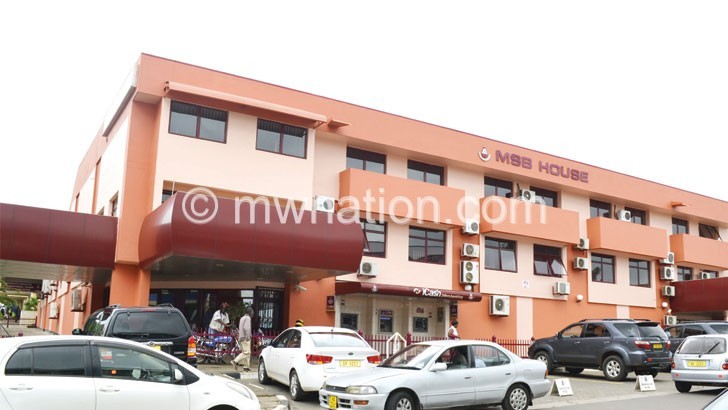Ex-MSB staff seek justice
Malawi Savings Bank (MSB) retrenched employees, who in 2016 sued for unfair dismissal, have petitioned Chief Justice Andrew Niyrenda to resolve the “painfully slow manner” in dispensing justice at the Industrial Relations Court.
The 212 former workers complained in a letter dated October 19 2020 that since their case began in 2016 (Industrial Relations Court-IRC matter number 222 of 2016), they have noted that the court is facing serious challenges such as shortage of staff resulting in delays to dispense justice.

“This is not only in relation to us but to several other litigants,” reads the complaint letter addressed to the Chief Justice.
The former MSB staff were retrenched by FDH Bank Limited after its parent company, FDH Financial Holdings Limited, wholly acquired and took over the government-owned commercial bank on July 3, 2016.
The retrenchment followed after FDH Bank, founded in 2008, began the process of merging the two banks by integrating operations of MSB with those of FDH Bank.
Government started the process to sell its commercial bank in 2013 following the bank’s inability to meet liquidity requirements that resulted in both the International Monetary Fund (IMF) and World Bank recommending that the financial institution should be sold.
At that time, MSB needed a capital of $48 million by June 2015 to avoid being de-licensed, according to a 2014 report by the Reserve Bank of Malawi (RBM).

The sale of MSB provoked protests from Malawians including Parliament and civil society organisations but government remained adamant until FDH Financial Holdings Limited successfully acquired its ownership.
Dissatisfied with the manner in which they were laid off after the bank was sold, Justin Chikaonda and Ezekiel Mangani and 210 other former MSB employees dragged FDH Bank Limited to court in 2016 for unfair dismissal.
And for more than four years, the frustrated retrenched workers feel the steps taken to determine the matter have been “painfully very slow.”
In an interview on Tuesday, Mangani, a former MSB ICT infrastructure manager, confirmed the petition to the Chief Justice.
He said: “The long delay in determining our case after hearing was completed is what prompted us to write the Chief Justice. We were unceremoniously laid off in 2016 and we are in the fifth year now without the matter being determined.”
Mangani said what was more painful was the fact that several other cases which came later at IRC were already determined and judgements delivered.
In their six-page letter, the former employees are wondering why the court has taken five years just to provide a date for judgement.
“We are told that the court is busy with other cases that were registered before our case came to court. As citizens of this country, we are guaranteed the right to access the courts.
“With the delays, we know that we have been denied justice and our right to access the courts as enshrined in the Constitution is just an illusion,” reads part of the letter.
Besides the delays, the ex-employees allege they have also noted that judicial workers discharging functions at IRC lack the requisite competences.
They wonder how their colleagues who were employed by FDH Bank and later also got retrenched had their case decided by the deputy chairperson of IRC a while they are still struggling to secure a date for judgement.
“We do not know how our friends were able to get a date of hearing and have their case concluded,” reads the letter.
The former MSB workers have also complained of “a very strange attitude towards the common litigant” by some judicial workers at IRC who they claim behave as if they are gods.
Reads their letter: “The arrogance that characterises that court must be stopped. There is also apparent lack of seriousness and a high degree of laziness. They cannot readily give dates and they work as if they do not get paid.”
Thus, they have asked the Chief Justice to rescue the situation and restore the court to normalcy by removing the “arrogant, incompetent and lazy officers” for the IRC to start kicking again and serve Malawians better.
The court users have said if the officers are to continue working, they must be told in clear terms to work hard, respect the citizenry and apply themselves to the task at hand.
They have also asked the Chief Justice to address the issue of critical shortage of judicial officers.
“In our view, looking at the nature of work at that Blantyre IRC, at least four people would be able to handle the case log. Note also that we are not the only litigants who are crying because of the problems at the court. There are more Malawians in the same situation,” concludes the letter.
Year in year out, the number of outstanding rulings has been steadily, rising placing a heavy load on the justice system while also denying litigants timely justice.
However, the Judiciary has time and again blamed the slow delivery of justice on shortage of judicial officers and budget constraints.
In June this year, Weekend Nation compiled a list of cases awaiting judgements, it was revealed that som had been in court for more than 20 years.
At the time, Weekend Nation gathered about 300 concluded cases at the Supreme Court of Appeal, High Court (criminal and commercial divisions) and IRC whose judgements were yet to be delivered.
Those were both civil and criminal cases which were concluded between 1997 and 2019 but litigants were just kept waiting for the judges to hand down determinations.
Although efficiency of justice is a major component of fair trial, our compilation revealed, as of December 2019, one High Court senior judge had over 20 outstanding judgements—some dating back to 2001.
One such case was filed in 2003 under civil cause number 3072 involving Cane Products Limited (CPL) of former Cabinet minister Rolf Patel and his sons against Press Corporation Limited whose determination is yet to be made.
The Malawi Human Rights Commission (MHRC), which has the mandate to engage the Judiciary on such matters, bemoaned the delay in delivering judgement was impacting negatively on the enjoyment of human rights including the right of access to justice.
MHRC chairperson Reverend Patrick Semphere said people go to court to seek justice in any form as such any delays in handing down judgement represents denial of justice.
“First, the Judiciary must accept there is a problem. It must then take specific steps to address the backlog of outstanding judgements,” he said.
There was no immediate comment from the Judiciary as its spokesperson Agnes Patemba did not respond to our questionnaire but IRC registrar Innocent Nebi confirmed knowledge of the case but not the concerns and demands raised by the ex-employees.
“I am not aware about the issues and demands they raised with the Chief Justice because I was not copied their complaint letter. But I can indeed confirm that they have been inquiring about the date,” said Nebi.





